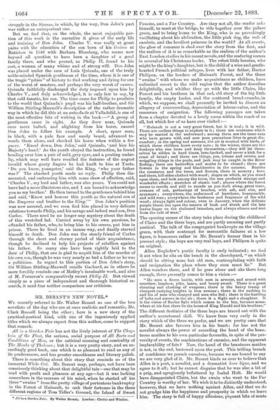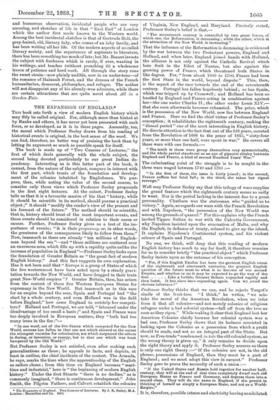MR. BESANT'S NEW NOVEL.*
WE recently referred to Mr. Walter Besant as one of the two novelists of the day who are at once realistic and romantic, Mr. Clark Russell being the other ; here is a new story of the practical-poetical kind, with one of the ingeniously applied titles which we always expect from this author, come to support that remark.
All in a Garden Fair has not the lively interest of The Chap- lain of the Fleet, the serious, social purpose of AU Sorts and Conditions of Men, or the satirical meaning and comicality of The Monks of Theletna ; but it is a very pretty story, and an ex- ceedingly good book, one which is as pleasant to read as any of its predecessors, and has greater smoothness and literary polish.
There is something about this story that reminds us of the immortal White Cat. Mr. Besant may, perhaps, not have been consciously thinking about that delightful tale—one that may be read with profit and pleasure at any age—but it was lurking somewhere in the recesses of his mind, when he started off his three" swains" from the pretty village of portentous bankruptcy in the Forest of Hainanit, to seek their fortunes in the three different regions of Tom Tidler's Ground, the Island of Sweet
* 411 in a Garden Fair. By Walter Bosant. London: (Matto and Windus.
Fancies, and a Far Country. Are they not all, the reader asks himself, to meet at the bridge, to ride together over the palace green, and to bring home to the King, who is so provokingly vacillating about his abdication, the little pink dog, the web of cambric, and the loveliest princess in the world P At all events, the glow of romance is shed over the story from the first, and the realism of it is as remarkable as the realism of the author's East London studies in his recent novels, and the seafaring scenes in several of his Christmas books. The sweet little heroine, who might be the king's daughter, but is the child of a wise and gentle- hearted .French political refugee, lives with her father, Hector Philipon, on the borders of Hainault Forest, and the three " swains" with whom we make acquaintance as children, have unlimited resort to the wild region that the author describes delightfully, and whither they go with the little Claire, like Poucet and his brethren in that sad, old story of the big little family, the empty larder, and the scattered bread-crumbs, in which, we suppose, we shall presently be invited to discern an allegory of overcrowding, depreciation of labour-value, and the resources of emigration. The following passages are taken from a chapter devoted to a lovely scene within the reach of us all, but which few of us have ever visited :—
" Hainault is not a very great forest, but it is real ; it is wild. There are endless things to explore in it ; there are creatures which may be started in the underwood ; among them are the tame cats who have grown wild, and now pass precarious lives in great dis- comfort; in the spring and summer, the air is musical with birds, of which these children know every note ; in the winter, there are the donkeys who run loose and keep themselves,—they will let them- selves be ridden in hard times, bare-backed, and never a kick for a crust of bread ; and there are things, yea, tritons and evvets, and wriggling things in the pools, and jack may be caught in the River Boding; there are butterflies and moths to be chased ; there are flowers in the spring and blackberries in the autumn. Besides the creatures, and the trees, and flowers, there is scenery ; here and there, hill-sides clothed with wood ; slopes on which, as'you stand upon them, and look among the trees, the sun produces strange and wonderful effects ; stretches of elastic turf ; places where the forest seems to recede and still to recede as you walk along, great trees, avenues of oak, gatherings of beeches, with ash, and elm, and sycamore ; everywhere, the underwood of hawthorn, honeysuckle, and wild rose ; everywhere the freshness and fragrance of the wild wood ; always light and colour, even in January, when the delicate purple bloom lies upon the masses of bush and shrub and the late leaves linger on the sheltered branches, and always silence and rest from the talk of man."
The opening scenes of the story take place during the childhood of Claire and the three boys, and are partly amusing and partly poetical. The talk of the congregated bankrupts on the village green, with their contempt for mercantile failures at a low figure, is humorous rather in Mr. Besant's former than in his present style ; the boys are very real boys, and Philipon is quite an original.
Allen Engledew's poetic faculty is early indicated ; we find it out when he sits on the bench in the churchyard, "on which should be sitting none but old men, contemplating with faith and resignation the place where they soon must lie." But Allen wanders there, and if he goes alone and sits there long enough, there presently comes to him a vision :—
"He -sees a fierce battle, with men in armour, and armed with crossbow, longbow, pike, lance, and heavy sword. There is a great shouting and clashing of weapons ; there is the heavy tramp of chargers carrying knights in iron armour ; there is the rushing to and fro of men who charged and men who fled ; there is the hurtling of bolts and arrows in the air ; there is a flight and a slaughter. It is the vision of Senlac fight which comes to the boy, because some- where at his feet there lie the bones of King Harold and his brothers." The different destinies of the three boys are traced out with the author's accustomed skill. We know from very early in the story which of the three we prefer, and we are pretty sure that Mr. Besant also favours him in his heart; for has not the novelist always the power of according the hand of the beau- teous maiden to his own particular favourite, in spite of the per- versity of events, the machinations of enemies, and the apparent implacability of fate? Now, the hand of the beauteous maiden is not, in the end, bestowed upon the poet. This trifling breach of confidence we permit ourselves, because we are bound to say we are very glad of it. Mr. Besant binds us over to believe that Allen is a poet, a novelist, and a dramatist hors ligne, and we agree to it all; but he cannot disguise that he was also a bit of a prig, and egregiously beflattered by Isabel Holt. He would have disappointed Claire, but the swain who went to the Far Country is worthy of her. We wish it to be distinctly understood, however, that we have nothing against Allen, and that we do not grudge him the happiness and prosperity in which we leave him. The story is full of happy allusions, piquant bits of acute and humorous observation, incidental people who are very amusing, and sketches of life in that "East End" of London which the author first made known to the Western world. Among the best incidental sketches is that of Gertrude Holt, the grey-haired, old, literary lady, who comes of an inky family, and has been writing all her life. Of the modern aspects of so-called literary society, and the experiences of aspirants to literature, there has been something too much of late; but Mr. Besant invests the subject with freshness which is rarely, if ever, wanting in his writings, and teaches (without preaching it) a wholesome lesson of patience and hard work. All through the story runs the sweet strain—now plainly audible, now in an tinder-tone—of the romance of Hainault Forest, and the dreams of the French humanitarian, democrat, philosopher, and refugee. The author will not disappoint any of his already-won admirers, while there are certain attractions that are quite novel about All in. a Garden, Fair.







































 Previous page
Previous page